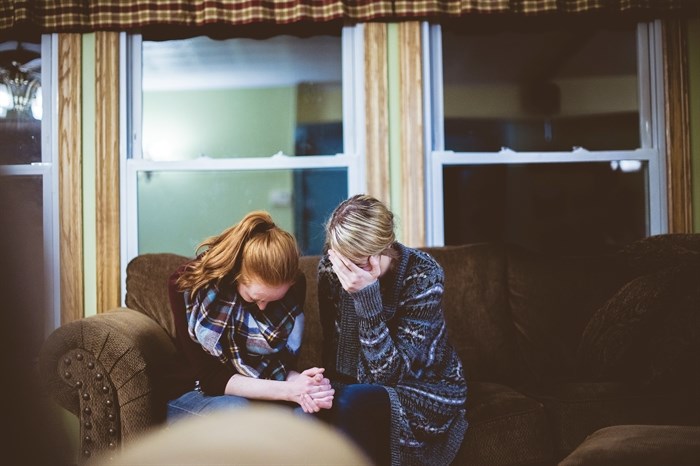
FILE PHOTO
Image Credit: UNSPLASH
May 04, 2025 - 4:00 PM
By time the average Canadian has reached middle age, they have likely witnessed dozens if not hundreds of deaths. But mostly what they have seen is the Hollywood version, which is of course is as far removed from reality as the typical movie plot itself.
On screens large and small, death most often arrives with great violence, a hero or villain gasping out their last words through clenched teeth.
Sometimes death arrives more peacefully with the heroine professing her last wishes or undying love, bathed in flattering light.
But even gentle movie deaths bear little resemblance to the way the average Canadian exits this world, most often in a hospital or hospice, possibly heavily sedated and likely with what family they have holding vigil beside them.
Real death is an abstract concept to most of us about which we know next to nothing and are reluctant to talk about, this despite the fact that it is absolutely unavoidable.
“There is so much misinformation about the end of life on everything from the legalities involved to how a body actually shuts down,” says Kelly Groenesteyn, a Peachland woman in the midst of the process of becoming a certified death doula through the End of Life Doula Association of Canada.
At least part of that misinformation, she says, is due to our collective reluctance to broach the subject, even in the most general way.
“No one wants to talk about death, though not talking about it doesn’t mean it isn’t going to happen,” she says. “It is the one thing in life you absolutely cannot avoid.”
The simple definition of a death doula is a non-medical professional trained to help people at the end of their lives, explains Groenesteyn.
“We work with people, spiritually, emotionally and mentally who are approaching the end of their lives,” she adds. “We help them wrap their head around what is coming. ”
But that simple definition covers a whole lot of ground.
A death doula will provide help with the minutiae of death, which can include everything from helping plan a funeral or celebration of life, drafting an advanced care plan and literally sitting with a person who may have no family and holding their hand as they draw their last breath.
“We can create a space for them to die peacefully by figuring out what their needs are,” she says. “That could include lighting, scented candles, music and even who they want in the room.”
On more pragmatic level, Groenesteyn says a death doula can help a person facing the end of life complete an advanced care plan, which she describes as a program that lays out in detail for their loved ones exactly how they want their death to unfold and who will make related decisions should they no longer be able to do it themselves.
It’s a planning exercise strongly advocated by both the provincial Ministry of Health and Groenesteyn herself. “Even if you don’t use a death doula, you should complete an advanced care plan,” she adds.
The plan can be found online and includes a worksheet that can be filled out manually on a paper copy or saved online.
Contained within it is information on the legal aspects of the death process.
That includes an advance directive, a legally binding document that records your consent or refusal on such things as artificial hydration and nutrition, defibrillation, life support and cardio-pulmonary resuscitation.
It also encourages advance planners to consider a medical order scope of treatment, a document completed by a medical doctor or nurse practitioner outlining the level of care you wish to receive.
Other legal documents include representation agreements where a substitute decision maker is named by you to decide on your behalf such things as personal care, living arrangements and the acceptance or refusal of consent to life preserving health care.
Groenesteyn points out that in the absence of such agreements in such situations, the provincial government will follow a preset list that starts with a spouse or common-law partner and goes from there through parents and siblings, other relatives, friends and ending with an appointed guardian.
This can give rise, she says, to someone making these decisions who you might not have considered or desired for that role.
Above all an advanced care plan encourages someone facing the end of life to think about all aspects of how they want to die, Groenesteyn adds, an exit strategy so to speak.
An end-of-life doula is not a registered health profession in British Columbia and they are governed in Canada only by one of several non-profit associations and the code of ethics and training regimens they require of their practitioners.
And to be clear, Groenesteyn says, a death doula is a paid service akin to a consultant, with fees that vary from person to person.
Other than within her own family, Groenesteyn herself has not yet been through a passing or the bedside vigil required to complete her certification with the End of Life Doula Association of Canada, although she has helped develop several advanced care plans.
“I’m working on that but it’s not something you can really advertise,” she says.
We welcome your comments and opinions on our stories but play nice. We won't censor or delete comments unless they contain off-topic statements or links, unnecessary vulgarity, false facts, spam or obviously fake profiles. If you have any concerns about what you see in comments, email the editor.
SUBSCRIBE to our awesome newsletter here.
News from © iNFOnews, 2025